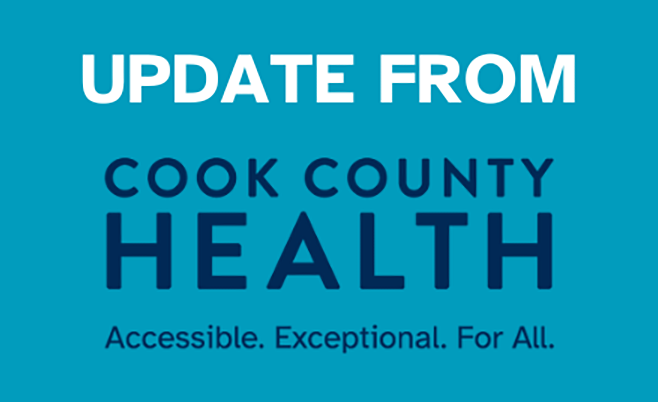Initial Results from the BLAZE-1 Trial Published in the New England Journal of Medicine
Results from a study led by Infectious Disease experts from Cook County Health indicate that patients with mild to moderate COVID-19 who received the Eli Lilly antibody drug therapy called LY-CoV555 on an outpatient basis may have experienced better clinical outcomes than patients who received the placebo. Called the BLAZE-1 study, the phase II, randomized, double-blinded, placebo-controlled outpatient trial enrolled 452 participants. Results from the study were published in the October 29 issue of the New England Journal of Medicine. Cook County Health was one of 24 academic medical institutions across the U.S. and one of only two in Illinois to lead the trial.
The antibody known as LY-CoV555 was derived from one of the first U.S. patients to survive COVID-19. Study participants were given a one-time intravenous infusion of the medication LY-CoV555 of either 700mg, 2,800mg or 7,000mg, or a placebo. At Cook County Health, study participants enrolled in the trial were predominately LatinX and African American.
Study participants who received the monoclonal therapy experienced fewer hospitalizations and ER visits compared to those who only received the placebo. The severity of symptoms in patients who received the drug therapy improved on days 2-6 with the acceleration of the virus resolving by day 3.
The initial portion of the BLAZE-1 study examined the efficacy of LY-CoV555 in treatment of mild-to-moderate COVID-19 illness. The study was designed to enroll patients with recent onset of disease and provided the opportunity to evaluate the impact of early intervention with antibody therapy on viral load biomarkers, symptoms, and severe clinical outcomes such as hospitalizations and death.
The study found that on Day 3, for patients who received 2,800mg dosage, the observed reduction in mean log viral load from baseline compared with placebo was Δ=-0.64 (95% CI -1.11 to -0.17). The other two doses of LY-CoV555 showed similar improvements in viral clearance at Day 3 versus placebo (700mg Δ=-0.42, 95% CI -0.89 to 0.06; 7,000mg Δ=-0.42, 95% CI -0.90 to 0.06). The change compared with placebo for the pooled doses of LY-CoV555 at Day 3 was =-0.49 (95% CI -0.87 to -0.11).
“It is important to evaluate therapies that use technology to mirror our own immune system’s ability to disarm potential damaging effects of viral infections to prevent serious complications we’ve seen during this COVID-19 pandemic,” said Dr. Gregory Huhn, an infectious disease physician for Cook County Health and principal site investigator of the BLAZE-1 study. “Our hope has been that the antibody drug will reduce COVID symptoms quickly after diagnosis and help to eradicate the virus more quickly.”
Dr. Huhn who is also a coauthor of the recently published article in the NEJM said, “While a vaccine is still likely necessary to generate overall population protective immunity, this drug therapy has the potential to deliver favorable clinical outcomes and prevent complications of COVID-19.”
According to Dr. Huhn, the expansion of the BLAZE-1 study will include higher risk individuals such as individuals over 65 or those with diabetes, obesity, hypertension, cardiovascular, autoimmune and kidney diseases. The study will also expand to adolescents.
Eli Lilly and Company, the maker of the antibody medicine LY-CoV555, sponsored the study.
Eli Lilly and Company is partnering with AbCellera Biologics Inc. to develop antibodies as a potential treatment for COVID-19, and Lilly will use AbCellera’s core platform screening technologies to select a candidate’s antibody gene sequences from a recently recovered COVID-19 patient’s serum. Lilly plans to develop antibodies that will prevent subsequent viral entry into human cells and viral replication, which is expected to mitigate the severity of the disease in some patients. The decrease in viral replication may also shorten a patient’s extent and duration of viral shedding and transmission, positively impacting public health.
CONTACT:
Elizabeth Pedersen, Communications Manager
[email protected]
312-805-1557

